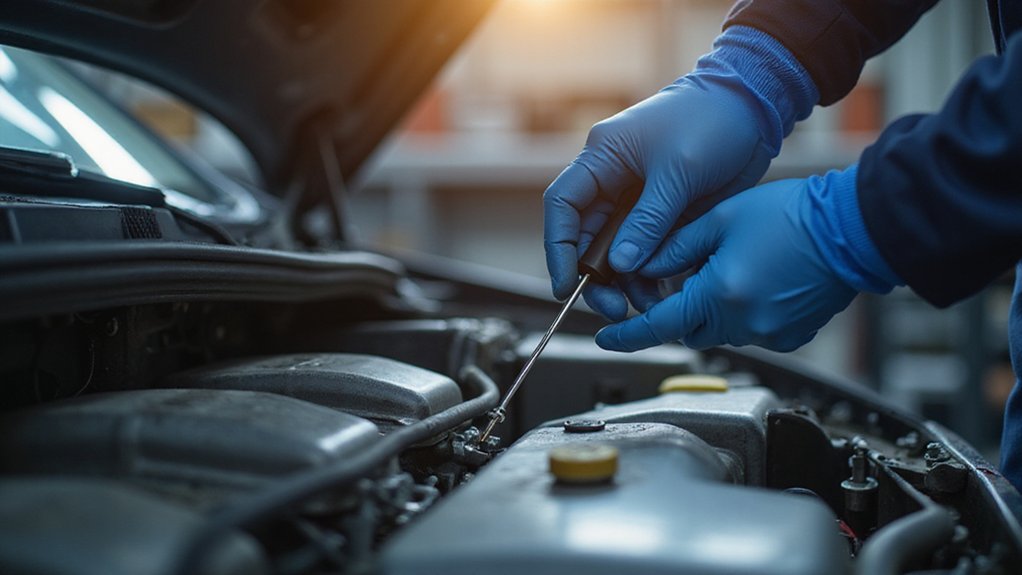You should check your car's essential fluids monthly or before long trips. Inspect engine oil, coolant, brake fluid, power steering fluid, and transmission fluid to catch potential issues early. Consult your vehicle's manual for specific maintenance schedules, as intervals can vary based on your car's make and model. Staying proactive with fluid checks can protect your vehicle's performance and prevent costly repairs down the road.
Understanding Fluid Check Frequency Basics
While maintaining your car's health might seem formidable, checking its fluids regularly is easier than you think. Most car experts recommend checking your vehicle's essential fluids monthly or before long trips.
You'll want to inspect engine oil, coolant, brake fluid, power steering fluid, and transmission fluid. Each fluid plays a pivotal role in your car's performance and longevity. By developing a consistent checking routine, you'll catch potential issues early and prevent expensive repairs.
Don't worry—with practice, you'll become confident in maintaining your car's indispensable systems. If you need professional assistance, emergency towing services can help diagnose fluid-related issues during roadside emergencies.
Engine Oil Maintenance Schedule
The engine oil lifeblood demands a strategic maintenance rhythm that'll keep your vehicle running smoothly. You'll want to stay proactive about monitoring and changing your car's oil to prevent costly mechanical issues. Long-distance tow services can help transport your vehicle for essential maintenance if needed.
- Check your vehicle's owner manual for specific manufacturer recommendations
- Generally, seek to change oil every 5,000-7,500 miles for conventional oil
- Consider synthetic oil options for extended intervals up to 10,000-15,000 miles
Modern driving habits and vehicle types can influence your ideal maintenance schedule. By staying attentive and consistent, you'll protect your engine's performance and longevity, thereby saving money and maintaining your car's reliability.
Coolant and Antifreeze Inspection Guidelines
Checking your car's coolant and antifreeze levels isn't just a routine maintenance task—it's a critical defense against potential engine damage. You'll want to inspect these fluids regularly to prevent overheating and protect your vehicle's performance.
Most manufacturers recommend checking coolant levels every six months or before long trips, ensuring your engine stays at the right temperature. Look for the translucent reservoir near your radiator, and verify the fluid is between the minimum and maximum lines.
If you're unsure about the color or condition, consider consulting a professional mechanic who can help you maintain your car's health and prevent costly repairs.
Transmission Fluid Monitoring Tips
Since transmission fluid plays an essential role in your vehicle's performance, you'll want to monitor its condition regularly to prevent potential mechanical issues. Checking your transmission fluid can save you from costly repairs and unexpected breakdowns.
Look for the correct transmission fluid dipstick under your vehicle's hood. Check fluid levels when the engine is warm and running. Inspect fluid color and consistency for signs of wear or contamination.
You'll want to consult your vehicle's manual for specific recommendations, as checking intervals can vary between different makes and models. Regular monitoring guarantees your transmission stays healthy and performs at its best.
Brake Fluid Care and Replacement
When maintaining your vehicle's safety, brake fluid demands careful attention and regular monitoring. You'll want to check its level and condition at least twice a year to safeguard peak performance. Healthy brake fluid appears clear or slightly amber, while contaminated fluid looks dark and murky.
If you notice it's low or discolored, it's time for a replacement. Don't overlook this critical maintenance task—brake fluid protects your car's braking system and prevents costly repairs. Trust your vehicle's manual for specific guidance, and consider professional inspection if you're unsure about the fluid's condition.
Power Steering Fluid Check Intervals
As your car's power steering system relies on proper fluid maintenance, you'll want to develop a consistent routine for checking its levels and condition. Regular inspections can prevent potential steering issues and costly repairs down the road.
Check power steering fluid every 3,000 to 5,000 miles or during routine oil changes. Look for signs of low fluid like steering wheel stiffness or unusual noises. Inspect the fluid color, ensuring it remains clear or light amber without dark discoloration.
You'll protect your vehicle's performance by staying proactive and attentive to these critical maintenance steps.
Additional Important Vehicle Fluid Checks
Why neglect your car's essential fluids when they're crucial to its longevity and performance? Brake fluid, coolant, and transmission fluid are just as critical as oil. You'll want to check these regularly to prevent costly repairs and unexpected breakdowns.
Your car's manual will provide specific guidance on fluid check frequencies, but most recommend inspecting them every few months. Don't worry if you're not mechanically inclined—many auto shops offer free fluid checks. By staying proactive, you'll keep your vehicle running smoothly and avoid potential roadside emergencies.
Frequently Asked Questions
Can I Check Fluids Myself Without Professional Automotive Knowledge?
You can easily check most fluids yourself with simple tools. Your car's manual provides clear guidance, and YouTube tutorials can help you learn the basics quickly and confidently.
What Happens if I Skip Regular Fluid Maintenance?
You'll risk serious engine damage, costly repairs, and potential roadside breakdowns if you neglect your car's fluid maintenance. Skipping regular checks can lead to catastrophic mechanical failures that'll drain your wallet.
Are Fluid Checks the Same for All Vehicle Types?
You'll find fluid check needs vary by vehicle type, with different makes and models requiring unique maintenance schedules based on their design, age, and driving conditions.
How Much Does a Typical Professional Fluid Check Cost?
You'll typically spend $20-$50 for a professional fluid check, depending on your location and vehicle type. Most mechanics include this service during routine maintenance, helping you keep your car running smoothly.
Do Electric Vehicles Require the Same Fluid Maintenance?
You'll find electric vehicles need less fluid maintenance, with only coolant, brake fluid, and windshield washer fluid to check. Battery and electrical systems are simpler, requiring less frequent professional inspections.



